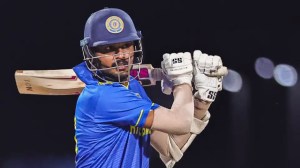Supreme Court puts question mark on Bihar elections
In a dramatic change of attitude, the Supreme Court today put a question mark on the upcoming Bihar elections keeping open the possibility o...

In a dramatic change of attitude, the Supreme Court today put a question mark on the upcoming Bihar elections keeping open the possibility of even restoring the dissolved Assembly.
A three-judge bench, headed by Chief Justice of India R C Lahoti specifically permitted one of the petitioners, Poornima Yadav, who was an independent MLA in the dissolved House, to move an application for interim orders.
It granted the permission on Poornima Yadav8217;s petition after her counsel, P S Narasimha, pointed out that, under the landmark ruling in the S R Bommai case, 8216;8216;the least relief8217;8217; that could be granted in the circumstances was 8216;8216;an injunction restraining the holding of fresh elections for constituting the new Legislative Assembly.8217;8217;
The bench brushed aside the contention of the Government counsel, Gopal Subramanium, that the interim relief envisaged by the Bommai verdict could not be applied to Bihar where the Assembly was dissolved without even being constituted and where the Election Commission is already at an advanced stage of drawing up the election schedule.
The court8217;s willingness today to exercise the powers conferred by the Bommai verdict is a far cry from the view taken only last month by a bench comprising Justice P Venkatarama Reddi and Justice Arijit Pasayat that it had a 8216;8216;limited scope of judicial review in a matter of this nature.8217;8217;
While dealing with another petition filed by those who were NDA MLAs in the dissolved Assembly, the Reddi-Pasayat bench was reluctant to issue a notice to the Centre. 8216;8216;It is made clear that at this juncture we are not issuing any notice,8217;8217; the court had said, when the petition challenging the dissolution of the House on the midnight of May 22 was heard for the first time on June 10.
But the Chief Justice8217;s bench today issued notices to the Centre not just on Poornima Yadav8217;s petition but also on the petition of those who were NDA MLAs. The bench added for good measure that the former MLAs 8216;8216;have made out a case8217;8217; for their petitions to be entertained.
One obvious reason for this change in the court8217;s attitude was the Centre8217;s failure to show what cogent material President A P J Abdul Kalam had before him to arrive at the conclusion that NDA was engaged in horse-trading to attain majority in the face of a hung verdict in Bihar.
The bench, which included Justice C K Thakker and Justice P K Balasubramanyam, agreed with the contention of Soli Sorabjee, senior counsel for NDA MLAs, that the President could not exercise his discretion to dissolve the Assembly without applying his mind.
Sorabjee pointed out that, far from producing any concrete evidence in terms of the Bommai verdict, all that the Centre said in its affidavit before the court was that Governor Buta Singh had sent two reports indicating 8216;8216;very likely attempts at horse-trading.8217;8217;
The bench expressed concern over the speed with which the decision to dissolve the House was taken. The disclosures made by the Government show that the fateful Cabinet meeting took place at 11 pm on May 22 and within three hours the necessary documents were faxed to the President from Delhi to Moscow, where he was then on an official visit. The President in turn gave his assent in the wee hours of May 23 at 3.30 am.
Incidentally, just when the Bihar case was taking a serious turn today before the Supreme Court, the Union Cabinet decided to extend the President8217;s Rule in the state by another six months. Thus, the apex court and the highest executive body today pulled Bihar in opposite directions.
Though the court gave three weeks to the Government to justify the circumstances in which it dissolved the Assembly, the matter is likely to resurface within this week itself as Poornima Yadav files the interim application permitted by the bench.
- 01
- 02
- 03
- 04
- 05































